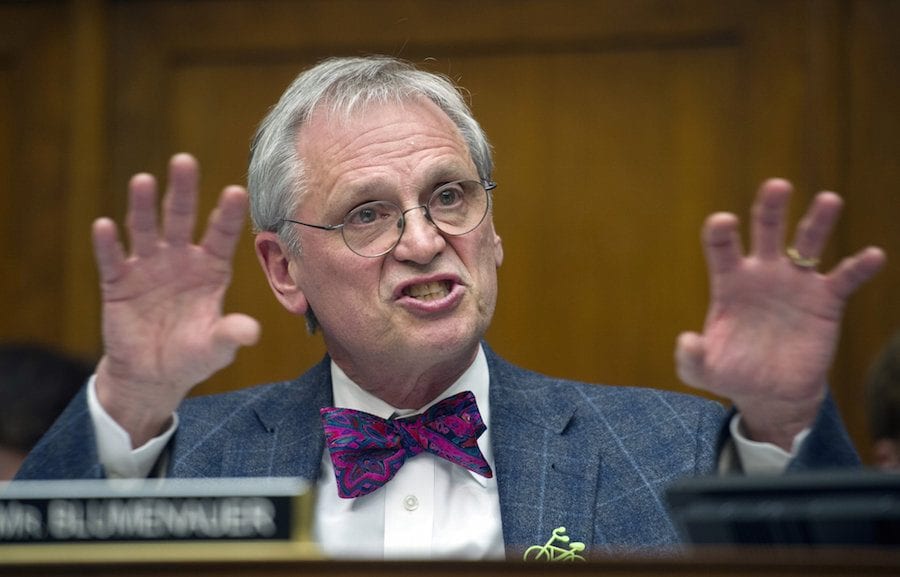Rep. Earl Blumenauer introduced H.R. 420 and it’s gaining momentum. If the bill passes, cannabis will be de-scheduled and controlled much like alcohol and tobacco.
It’s strange to see a time when there are aggressive Democrats in Congress. Of course, AOC is making the most noise (she even somehow made C-SPAN popular again), but Representative Earl Blumenauer of Oregon’s 3rd congressional district has been leading the charge on cannabis reform for decades. Earlier this month, his persistent aggression on cannabis reform came in the form of H.R. 420, the Regulate Marijuana like Alcohol Act.
What H.R. 420 Would Mean for Cannabis
He’s pushing a bill that would drastically change the federal approach to cannabis. Most importantly, H.R. 420 would strike cannabis from the Controlled Substances Act. It would no longer be a scheduled drug.
Then, the bill would create a new industry that would be regulated by the Bureau of Alcohol, Tobacco, Firearms, and Explosives. In other words, the industry will likely resemble the alcohol industry with taxes, limitations on licenses, and heavily regulated establishments.

Image credit: Oregon Live
Its chances of passing the House are uncertain. Less certain is the likelihood of it passing the Senate, though they did recently help pass the Farm Bill which included hemp legalization. Then there’s a total wildcard once it gets to the President’s desk, though he has indicated in the past that he would support a bill to end cannabis prohibition.
Rep. Blumenauer – the Leader We Need?
To keep our eyes on this subject, we should follow Rep. Blumenauer who told us his plan last year in a memo to House Democratic Leadership.
He plans to move as swiftly as possible. After arranging hearings on cannabis reform, his plans included districts marking up bills that do several things:
- Provide equal taxation for cannabis businesses;
- Protect employers and employees of cannabis businesses;
- Give cannabis businesses access to financial services;
- Remove barriers to cannabis research;
- Protect private property from civil asset forfeiture;
- And more.
The final result is ambitious. Rep. Blumenauer wants federal legalization of cannabis to be enacted by the end of 2019. After the hearings and markups, he projects that the House should have a full bill ready and passed between September and December of 2019.
He even used bold language in the memo to inspire a sense of urgency, he said of the recent Farm Bill, “we must build on this momentum…now is our moment.”
Being Pragmatic: Back Up Plans A, B, C, and D
Despite his fortitude and effort, he’s also pragmatic and offered back-up plans should full legalization lose steam. He set priority number one to be the descheduling of cannabis and listed four other bills that could be passed to do it in a less direct way. Those bills are:
- The Marijuana Regulation and Revenue Act that is in both the Senate and the House;
- The Marijuana Freedom and Opportunity Act brought forth by Democratic Leader Schumer;
- The Ending Federal Marijuana Prohibition Act that’s currently in the house; and
- The Marijuana Justice Act introduced by Senator Booker and Rep. Barbara Lee.

Should legalization not come quickly, Rep. Blumenauer will focus on passing the Responsibly Addressing the Marijuana Policy Gap Act. The attention would still be focused on criminal justice, veteran access to cannabis, the protection of state laws, the promotion of research, and creating a normalized industry.
All we have to do as a nation is give the government control of the plants.
In the end, cannabis shouldn’t need regulations at all. Nor should any plant, other than to assure they are clean when they reach the public. There shouldn’t be any laws saying how to grow and utilize plants, but our society puts up with plenty of them. There are regulations on how tall your grass can grow, laws against taking old food from grocery stores and giving it to homeless people, and many other arbitrary laws.
From a philosophical perspective, cannabis needs no regulations. From a legal context, H.R. 420 is likely the best thing plant-medicine advocates are going to get. It’s a business and the government is going to have their share and say.
Consider H.R. 420 a win, overall—if it passes.





